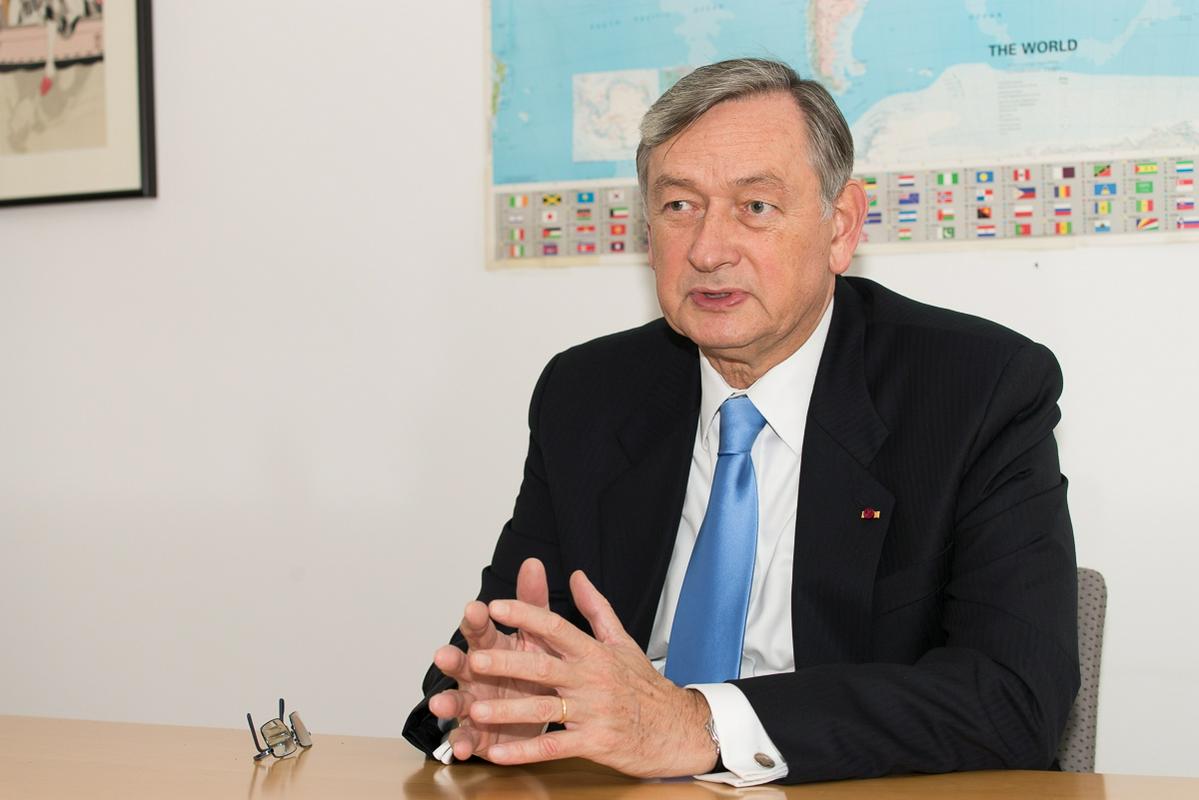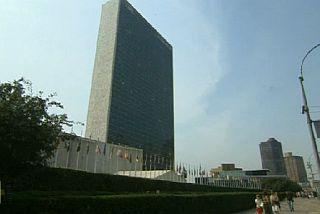

Dr. Danilo Türk, the former President of the Republic and a diplomate, has been involved with the work of the United Nations for more than three decades. He was the ambassador of Slovenia at the organisation at the time Slovenia presided the Security Council, between 1998 and 1999. Next Kofi Annan, the Secretary-General of the United Nations, appointed him as his Assistant for Political Affairs. Presently Türk is applying for the position of Secretary-General of the organisation, as the term of office of the present Secretary-General Ban Ki Mun is to expire by the end of next year. We had the opportunity to talk to Danilo Türk at the occasion of the United Nations 70th anniversary, celebrated on October 24.
When the first Secretary-General Trygve Lie turned over his office to his successor Dag Hammarskjöld, he said it was the most impossible job on earth. Are you ready to accept this most impossible job?
It indeed is the most impossible job, but it is also the most noble of jobs. Important things can be done, regardless of the problems. I worked for the UN for more than 30 years, doing several jobs, including working on Human Rights, in the General Assembly, the Safety Council, in the Secretariat, and I know how difficult it is, and how frustrating. But at the same time progress is being made, which makes a person believe that he can really contribute something. Trygve Lia's words are quoted very often, but they do not express everything about the position of Secretary-General. Of course I am willing to accept the challenges arising from the position of Secretary-General, as I am convinced that it is a noble function, thus motivating a person to apply himself fully. Comfort can't be motivation in this case, as it is a very uncomfortable position…
Is your campaign already in motion? Not much is heard about it in Slovenia, while most certainly negotiations are going on, and agreements are being discussed in the background?
There is no real campaign yet, only diplomatic consultations. I am in contact with a number of diplomatic representatives and other influential people throughout the world, as adequate for this period. There is no need for very noticeable actions a year of two before the expiry of the term of the present Secretary-General. The present course of consultations is sufficient.
One of your competitors, the Minister of Foreign Affairs of Croatia Vesna Pusić publicly admitted active lobbying for her appointment to the position was already going on. What about yours?
I see no need for any lobbying. The candidacy for the position of the Secretary-General of the United Nations is a serious matter. It requires serious discussions with serious people; it is above lobbying and persuasion known in internal political election campaigns. Those who will make the decision know very well what they are deciding about; those are the people with whom direct and indirect contacts are necessary, and things must be discussed with them. Based on that, the best candidate can be chosen, the one which is the most suitable for the position. And that's the whole philosophy.
For your nomination you would need the support, or at least abstention of all the five Safety Council permanent members. Have any of them already given you a hint?
No, the permanent members as a matter of habit keep their opinions to themselves until the very end. It would be naive to expect them to explain their position in advance. I am in contact with all of them, and they all know me. I have been present in their circle for a long time, I worked at a number of projects, and I am acquainted with a number of people. The important thing now is to capitalize my experiences, to show what a candidate of my profile could contribute to the United Nations Organisation. Each of the decision-makers will deliberate and decide whether I am the candidate the times we live in require. The only way to convince the great powers is to present oneself as a candidate who would help the cause. All states, including the great powers, are quite often captives of international relations which demand the sensible cooperation of the UN Secretary-General. This fact is also being considered, but we are only at the initial stage. There are a number of other problems the decision-makers have to deal with at this time. The time for deciding on the new Secretary-General has not arrived yet.
As the President of the Republic you had occasionally divided the Slovenian society with your actions, and it continued until today. The government and the President of the Republic stand behind your candidacy and support you, while the opposition is against it, and promise to deny you the support. Could that show your candidacy in bad light, could that be an obstacle?
The opinion on the division is much overrated. We are a democratic state, where different opinions are allowed. It would be unrealistic to expect absolute support by all political actors. But I expect more deliberations at home. Slovenia should take into account its international role, the opportunities it would gain, and make the right decision based on that. It must be first established which factors should be taken into consideration when deciding on such matter. In politics certain things must be done, also when not pleasing to all – but that's true for everybody ever involved in politics. But when representing the nation at the international level, one would expect certain restraint and consideration towards the common goal, which should have advantage before the possible local disagreements.
On paper you seem like an ideal candidate, with 30 years of service in the UN, being the former President of the Republic, coming from Eastern Europe (which should supposedly be the origin of the new candidate). Recently Ernest Petrič labelled you as a very credible candidate, based on the mentioned attributes. And what is your assessment?
Most certainly my candidacy can be considered credible. In my opinion it is very important for Slovenia, as it would be rather unusual had Slovenia failed to announce this credible candidacy at the moment it is the turn of the region, this electoral region Slovenia belongs to, to show what it has to offer. There is no guarantee of success, but this project has all the possibility to succeed, and it has the credibility professor Petrič spoke about. There is no denying it. There is a question of the degree of suitability, and adequacy at the given moment. We are talking about variable geometry here – at the moment, a year before the elections, it can't be precisely measured. In my opinion it should be realized that we have a credible project, which would allow us to do something good at the international level. As the things develop, we will know more precisely how close we are to succeeding.
Some of your most dangerous competitors are previously mentioned Vesna Pusić, Irina Bokova from Unesco, and the Macedonian diplomat Srgjan Kerim. What is your estimation of their candidacies, and what are their prospects?
I refrain from estimating the prospects of other candidates. It is uncalled for, and it simply wouldn’t be nice.
It is often said that after eight male Secretaries-General the time has come for a female Secretary-General. Besides Irina Bokova several other names are being mentioned: the President of Brazil Dilma Rousseff, the President of Chile Michelle Bachelet, the former Prime Minister of New Zealand Helen Clark. Do you believe female candidates will have a better chance for success, or gender will play no role?
That's an interesting question. It is not yet clear how will that aspect influence the final phase of the elections, if at all, approximately nine months from now. It is difficult to predict. But in the end, the most important is the individuality of a candidate, male or female. The decision cannot be based on the gender. The resolution of the General Assembly encourages nomination of female candidates, of qualified female candidates. Women have the possibility to stand as a candidate, and will be evaluated on equal rights basis. It is the principle I believe in, it must be guaranteed. I believe that on the international level it has become valid, and there are no more prejudices against female candidates. The executive director of IMF Christine Lagarde is a woman. There were no prejudices against a woman managing IMF; her capabilities and her experiences were the most suitable. But nobody emphasized her gender. Her being a woman did not play a big role in her candidacy, it was neither a hindrance, nor a big help. With lesser qualifications and less experience she probably would not succeed in her candidacy. Nor can it be said that she was subjected to discrimination. There will be no discrimination in the UN, but every candidate, both male and female, will be thoroughly appraised.
Do you consider the support of the Slovenian diplomatic network sufficient?
For now it is shown in the quantity which is strictly necessary, later we will know more. It depends on the development of things, and what kind of support would be required. It is a specific candidacy – an individual, and not a national candidacy. The state supports the candidacy, makes it formal and assures diplomatic support. But due moderation should be observed; exaggeration must be avoided – especially in this case.
Brina Tomovič
Translated by G. K.

































































